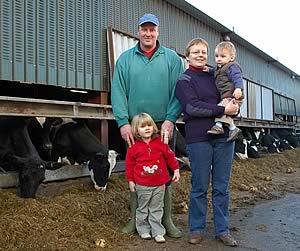01/04/08
Rising concentrate and energy costs are forcing dairy producers
to think again how they can reduce those inputs.
Robert and Lesly Kirkwood with Katie and John
 |
Grazed grass and other homegrown forages offer a real solution
and this spring will provide the opportunity to consider how
their potential can be fully exploited, according to Robert Kirkwood,
of Mouswald Grange, Mouswald, Dumfries.
“We have cut our costs by 2ppl in the last 12 months thanks
to a forage strategy we introduced over five years ago, which
has enabled us to cut back on concentrate fed by more than 40%
to 1.75t/cow and make an 80% reduction on fertiliser to 30 units
N/acre applied to the conservation swards,” he explains.
“At the same time, we have been able to focus on continuing
to maximize our herd’s potential. While we’ve maintained
herd size at 250 pedigree Holstein Friesian cows on our 500 acre
grassland holding, plus a further 140 acres of cereals, yield
has increased by 10% to a current 8,950 litres at 4.1% butterfat
and 3.3% protein.” The unit also takes all the male black
and white calves through to finishing at two years on an extensive
grazing system.
Robert began to focus on making more from milk from forage after
visiting New Zealand in 2001 and being inspired to bring some
ideas back home to Dumfriesshire. “Block calving cows bred
specifically for grazing systems was out of the question for
us because we wanted to maintain an all year round calving herd
breeding up to 50 heifer replacements for sale each year. However
we did admire how Kiwi farmers take their cows to harvest the
crop.”
A new forage management policy was introduced to Mouswald Grange
which includes extending the grazing season by up to one month
at either end side of the main period – that brings savings
of £1.50/cow/day in April alone; creating 5.5 acre paddocks;
developing a rotational paddock grazing system, ranging from
20 days in spring to nine days during peak grass growth; and
reseeding both paddocks for grazing and conservation with high
sugar perennial ryegrass.
Red and white clovers have also been introduced to grass leys
to supply 30% of the sward’s dry matter, and for the first
time this year, all the silage leys will feature clover and contribute
to reducing soya fed in the total mix ration by 1kg/cow/day.
Furthermore, chicory was introduced to the grazing ley mix for
the first time in 2007 to provide additional nutrients.
“The system we are adapting is very challenging and we
have to keep an open mind; we find we have to plan new ideas
well in advance, allow time to implement them and then be prepared
to continually tweak the outcome to what best suits this farm.
However, we are finding the system has brought rewards and it
has certainly improved our efficiency, particularly at a time
of unprecedented rises in variable costs.”
· Robert Kirkwood will host a technical
open day at Mouswald Grange on Wednesday
2 April, commencing at 10.30am. Organised by the Royal Association
of British Dairy Farmers, the British Grassland Society and Milk
Development Council, the event will focus on maximising grassland’s
potential. To book your place on the farm walk and reserve lunch
please contact RABDF on 0845 458 2711 or email lauradickinson@rabdf.co.uk.
 Union Reacts Cautiously to Milk Price Rise Union Reacts Cautiously to Milk Price Rise
 Better Milk Price But Higher Feed Costs Better Milk Price But Higher Feed Costs
 Yorkshire Dairy Farm Walk: Milking Grass for Profit Yorkshire Dairy Farm Walk: Milking Grass for Profit |



